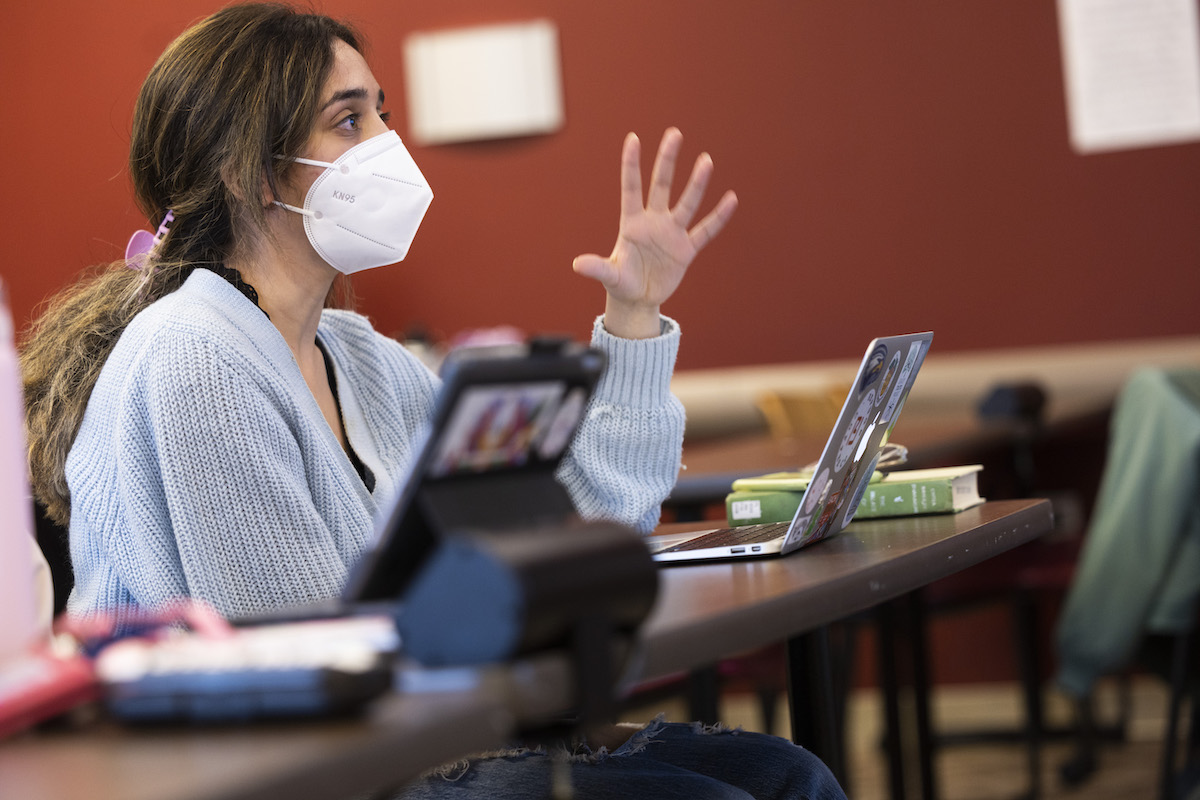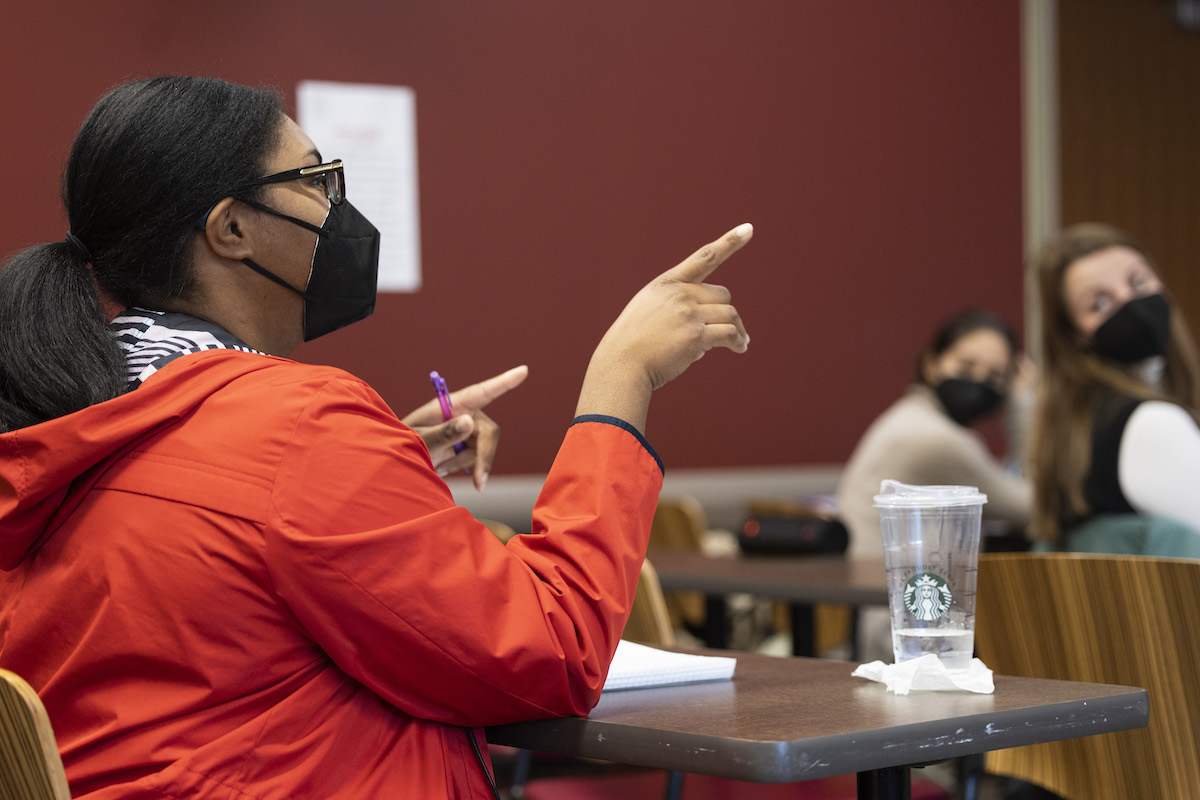Jodie Guest has been leading her students on a journey like no other. As convenor of this fall’s University Course, “Pandemic Reflections,” Guest has helped students focus on the HIV/AIDS and COVID-19 pandemics as teachable moments not only about science and disease, but about issues such as stigma, religion, inequity, politics and communication.
“We have so much to learn from what we’ve been living through,” says Guest, professor and senior vice chair of the Department of Epidemiology at Rollins School of Public Health. “And if we don’t spend the time to think about what we’ve learned, we’ll just make the same mistakes again. That’s a really important part of this class.”
Sponsored by Emory’s Center for Faculty Development and Excellence, the University Course is a unique opportunity open to undergraduate, graduate and professional students, who come together for the chance to examine important issues and topics and to encounter and enact a sense of common purpose across the diverse communities at Emory.
Guest is clearly invigorated about having the chance to share her considerable expertise with students from across the university, and to help empower them to learn from the recent and very recent past.
The course combined lessons from both the HIV/AIDS epidemic and COVID-19.
“Now is the moment to think about the parallels and the differences between the two epidemics,” says Guest, who for 17 years was director of HIV research at the Atlanta VA Medical Center and has been the investigator on more than 50 HIV-related research projects.
At the outset of the COVID-19 pandemic, Guest developed the Emory COVID-19 Outbreak Response Team to bring testing, vaccinations and information to underserved communities. She also hosts Emory’s COVID-19 scientific video communications.
Learning from experts
The course was organized around weekly themes — but that was only the beginning. Each week, students heard from some of the foremost experts in the nation on a range of issues, beginning with an introduction to COVID-19 led by Guest and Carlos del Rio, professor of medicine, global health and epidemiology at Emory. The next week, an introduction to HIV/AIDS was led by Guest and James W. Curran, dean emeritus of the Rollins School of Public Health, whose career had a remarkable impact on developments to combat the virus. Students in “Pandemic Reflections,” including Sriya Karra of Emory College, learned from experts before creating and critiquing their own communications vehicles in a variety of formats. 
Other class sessions included speakers such as Sandra Thurman, director of the Joseph W. Blount Center for Health and Human Rights at Rollins and chief strategy officer at the United States President's Emergency Plan for AIDS Relief (PEPFAR), on government response to pandemics; Susan Chana, former assistant vice president of communications at Emory and current senior vice president of public relations at Primerica, on communications; prominent LGBTQ+ scholar and journalist Steven W. Thrasher, author of the new book, “The Viral Underclass,” who spoke with class members and gave a public talk on pandemic inequities; and Gregg Gonsalves, professor at Yale and an original member of ACT UP and the Treatment Action Group (TAG) on politicization of public health.
Communicating about public health
Students not only had the chance to interact with speakers on the forefront of combatting HIV/AIDS and COVID-19, they also developed their own specific communications pieces, tailored for various audiences and in various formats, from writing a tweet on behalf of the White House to designing an infographic to combat misinformation about vaccines.
“Every time I’ve given a talk — and I’ve done a couple hundred lectures and presentations to community organizations about COVID-19 — they are always different, based on who I’m talking with, who is the audience,” says Guest. “I want that to be a skill set that we’re discussing in this class.”
Since the pandemic, Guest says she’s focusing more on communication in her public health courses, too, and students are responding enthusiastically, asking if they can delve into communication on a more regular basis.
“You don’t always have time in a methods course to add multiple lectures about effective science communication. But could that be a standalone elective? I would hope so. I would love to see that happen,” says Guest.
“One of the points of focus for this University Course is to show how good communication is critical. Our students have seen that miscommunication and misinformation cost us lives,” says Guest. “That’s a sad reality of this pandemic and we must do better at a time when distrust of science seems more pervasive than ever.”
Rollins School of Public Health student Brianna Smith asks a question during the “Pandemic Reflections” class.
One video showed a briefing given by New Zealand Prime Minister Jacinda Ardern at the outset of the pandemic — a time when mixed or conflicting messages were flowing in countries throughout the world, including the United States. This particular video has been written about as a master class in communications in a crisis situation.
Class members quickly began spotting the strengths of the prime minister’s messaging: She told everyone what was about to happen and why; directions were clear and specific; the tone was one of calm decisiveness.
In comparing New Zealand’s messaging to our own, Guest observes that “some of the changes in the messaging that were needed we knew — those of us who were thinking about the pandemic every single minute of the day — we knew immediately what we wish had been different,” says Guest.
“And some of the communication missteps took some hindsight for us to know what went wrong,” she adds. “We have to recognize and own that there were some pretty big missteps, including limited explanation when guidance was changed, and we must learn from them.”
“We are so grateful for Jodie’s leadership in this course,” says Donna Troka, director of diversity and inclusive pedagogy for Emory’s Center for Faculty Development and Excellence, which sponsors the course. “A lot of outside speakers participated because she knows them; her expertise and connections made for a rich learning environment.”
Forging connections across Emory and beyond
For second-year Oxford student Makalee Cooper, the course was a chance to explore “what I could be doing if I do decide to go into the world of public health.” Students get to investigate the “intersection between health and society, towards a more humanistic approach, then bring in the biological aspect,” she adds.
Taking a class with both undergraduate and graduate students was also a major draw for Cooper. “I’m used to being in classes with 18- and 19-year-olds,” she says, so interacting with public health or law students, who often ask questions that Cooper hadn’t considered, “is the coolest thing ever.”
Second-year MPH student Shannon Stephens also cites the breadth of perspectives available in the course. “It’s really insightful; there are aspects of COVID that people have experienced very differently, so you get a deeper understanding of all the facets of COVID’s impact.”
That breadth also includes a depth of knowledge from the array of experts who have participated in the course. “There’s nothing that compares with coming face to face with someone who has been on that path,” says Stephens.

